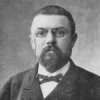Henri Poincare

Henri Poincare
Jules Henri Poincaréwas a French mathematician, theoretical physicist, engineer, and a philosopher of science. He is often described as a polymath, and in mathematics as The Last Universalist by Eric Temple Bell, since he excelled in all fields of the discipline as it existed during his lifetime...
NationalityFrench
ProfessionMathematician
Date of Birth29 April 1854
CountryFrance
leadership law long
The mathematical facts worthy of being studied are those which, by their analogy with other facts, are capable of leading us to the knowledge of a physical law. They reveal the kinship between other facts, long known, but wrongly believed to be strangers to one another.
ideas imagination long
For a long time the objects that mathematicians dealt with were mostly ill-defined; one believed one knew them, but one represented them with the senses and imagination; but one had but a rough picture and not a precise idea on which reasoning could take hold.
illumination long firsts
Most striking at first is the appearance of sudden illumination, a manifest sign of long unconscious prior work.
ideas long mind
Often when works at a hard question, nothing good is accomplished at the first attack. Then one takes a rest, long or short, and sits down anew to the work. During the first half-hour, as before, nothing is found, and then all of a sudden the decisive idea presents itself to the mind.
long form relation
Mathematicians do not deal in objects, but in relations between objects; thus, they are free to replace some objects by others so long as the relations remain unchanged. Content to them is irrelevant: they are interested in form only.
teaching long important
Mathematicians do not study objects, but relations among objects; they are indifferent to the replacement of objects by others as long the relations don't change. Matter is not important, only form interests them.
means necessary neither nor
Thus, be it understood, to demonstrate a theorem, it is neither necessary nor even advantageous to know what it means . . . .
american-journalist relations remain replace
Thus, they are free to replace some objects by others so long as the relations remain unchanged.
american-journalist
No more than these machines need the mathematician know what he does.
american-journalist governed phenomenon succeeding
If that enabled us to predict the succeeding situation with the same approximation, that is all we require, and we should say that the phenomenon had been predicted, that it is governed by the laws.
avoiding consists infinite invention useful useless
Invention consists in avoiding the constructing of useless contraptions and in constructing the useful combinations which are in infinite minority. To invent is to discern, to choose.
american-journalist cannot cause determines due effect escapes notice
A very small cause which escapes our notice determines a considerable effect that we cannot fail to see, and then we say that the effect is due to chance.
american-journalist believe both convenient equally necessity
To doubt everything, or, to believe everything, are two equally convenient solutions; both dispense with the necessity of reflection.
american-journalist species
It has adopted the geometry most advantageous to the species or, in other words, the most convenient.